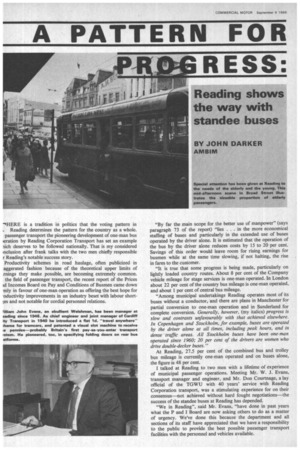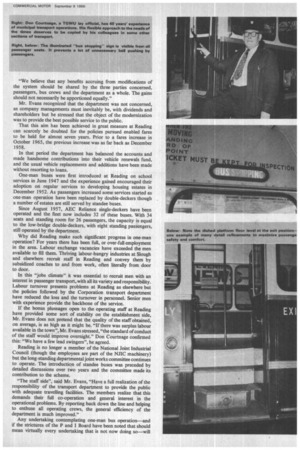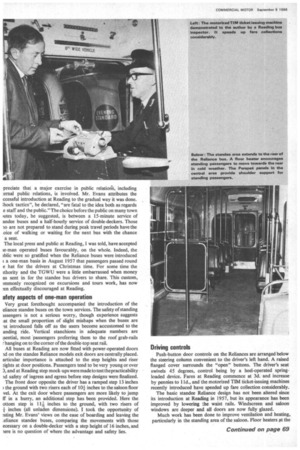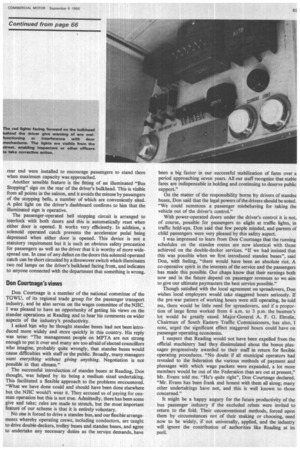RESS:
Page 66

Page 67

Page 68

Page 71

If you've noticed an error in this article please click here to report it so we can fix it.
44 Reading shows
the way with standee buses
BY JOHN DARKER
AMBIIIA
',HERE is a tradition in politics that the voting pattern in Reading determines the pattern for the country as a whole. passenger transport the pioneering development of one-man bus oeration by Reading Corporation Transport has set an example lich deserves to be followed nationally. That is my considered Inclusion after frank talks with the two men chiefly responsible r Reading's notable success story.
Productivity schemes in road haulage, often publicized in aggerated fashion because of the theoretical upper limits of .rnings they make possible, are becoming extremely common. the field of passenger transport, the recent report of the Prices id Incomes Board on Pay and Conditions of Busmen came down inly in favour of one-man operation as offering the best hope for .oductivity improvements in an industry beset with labour shortps and not notable for cordial personnel relations. "By far the main scope for the better use of manpower" (says paragraph 73 of the report) "lies . . . in the more economical staffing of buses and particularly in the extended use of buses operated by the driver alone. It is estimated that the operation of the bus by the driver alone reduces costs by 15 to 20 per cent. Savings of this order would leave room for rising earnings for busmen while at the same time slowing, if not halting, the rise in fares to the customer.
"It is true that some progress is being made, particularly on lightly loaded country routes. About 8 per cent of the Company vehicle mileage for stage services is one-man operated. In London about 22 per cent of the country bus mileage is one-man operated, and about 1 per cent of central bus mileage.
"Among municipal undertakings Reading operates most of its buses without a conductor, and there are plans in Manchester for partial conversion to one-man operation and in Sunderland for complete conversion. Generally, however, (my italics) progress is slow and contrasts unfavourably with that achieved elsewhereIn Copenhagen and Stockholm, for example, buses are operated by the driver alone at all times, including peak hours, and in densetraffic areas. All Stockholm buses have been one-man operated since 1960; 20 per cent of the drivers are women who drive double-decker buses."
At Reading, 27.5 per cent of the combined bus and trolley bus mileage is currently one-man operated and on buses alone, the figure is 48 per cent.
I talked at Reading to two men with a lifetime of experience of municipal passenger operations. Meeting Mr. W. J. Evans, transport manager and engineer, and Mr. Don Courtnage, a lay official of the TGWU with 40 years' service with Reading Corporation transport, was a stimulating experience for on their consensus—not achieved without hard fought negotiations—the success of the standee buses at Reading has depended.
"We in Reading", said Mr. Evans, "have done in past years what the P and I Board are now asking others to do as a matter of urgency. We've done this because the department and all sections of its staff have appreciated that we have a responsibility to the public to provide the best possible passenger transport facilities with the personnel and vehicles available. "We believe that any benefits accruing from modifications of the system should be shared by the three parties concerned, passengers, bus crews and the department as a whole. The gains should not necessarily be apportioned equally."
Mr. Evans recognized that the department was not concerned, as company managements must inevitably be, with dividends and shareholders but he stressed that the object of the modernization was to provide the best possible service to the public.
That this aim has been achieved in great measure at Reading can scarcely be doubted for the policies pursued enabled fares to be held for almost seven years. Prior to a fares increase in October 1965, the previous increase was as far back as December 1958.
In that period the department has balanced the accounts and made handsome contributions into their vehicle renewals fund, and the usual vehicle replacements and additions have been made without resorting to loans.
One-man buses were first introduced at Reading on school services in June 1947 and the experience gained encouraged their adoption ori regular services to developing housing estates in December 1952. As passengers increased some services started as one-man operation have been replaced by double-deckers though a number of estates are still served by standee buses.
Since August 1957, AEC Reliance single-deckers have been operated and the fleet now includes 32 of these buses. With 34 seats and standing room for 26 passengers, the capacity is equal to the low-bridge double-deckers, with eight standing passengers, still operated by the department.
Why did Reading make such significant progress in one-man operation? For years there has been full, or over-full employment in the area. Labour exchange vacancies have exceeded the men available to fill them. Thriving labour-hungry industries at Slough and elsewhere recruit staff in Reading and convey them by subsidized coaches to and from work, often literally from door to door.
In this "jobs climate" it was essential to recruit men with an interest in passenger transport, with all its variety and responsibility. Labour turnover presents problems at Reading as elsewhere but the policies followed by the Corporation transport department have reduced the loss and the turnover in personnel. Senior men with experience provide the backbone of the service.
If the bonus plussages open to the operating staff at Reading have provided some sort of stability on the establishment side, Mr. Evans does not pretend that the quality of the staff obtained, on average, is as high as it might be. "If there was surplus labour available in the town", Mr. Evans stressed, "the standard of conduct of the staff would improve overnight." Don Courtnage confirmed this: "We have a few lead swingers", he agreed.
Reading is no longer a member of the National Joint Industrial Council (though the employees are part of the NJIC machinery) but the long-standing departmental joint works committee continues to operate. The introduction of standee buses was preceded by detailed discussions over two years and the committee made its contribution to the scheme.
"The staff side", said Mr. Evans, "Have a full realization of the responsibility of the transport department to provide the public with adequate travelling facilities. The members realize that this demands their full co-operation and general interest in the operational problems. By reporting back down the line and helping to enthuse all operating crews, the general efficiency of the department is much improved."
Any undertaking contemplating one-man bus operation—and if the strictures of the P and I Board have been noted that should mean virtually every undertaking that is not now doing so—will preciate that a major exercise in public relation's, including .ernal public relations, is involved. Mr. Evans attributes the ccessful introduction at Reading to the gradual way it was done. hock tactics", he declared, "are fatal to the idea both as regards e staff and the public." The choice before the public on many town lutes today, he suggested, is between a 15-minute service of andee buses and a half-hourly service of double-deckers. Those to are not prepared to stand during peak travel periods have the oice of walking or waiting for the next bus with the chance a seat.
The local press and public at Reading, I was told, have accepted ie-man operated buses favourably, on the whole. Indeed, the iblic were so gratified when the Reliance buses were introduced a one-man basis in August 1957 that passengers passed round e hat for the drivers at Christmas time. For some time the ithority and the TGWU were a little embarrassed when money as sent in for the standee bus drivers to share. This custom, mmonly recognized on excursions and tours work, has now mi effectually discouraged at Reading.
afety aspects of one-man operation Very great forethought accompanied the introduction of the eliance standee buses on the town services. The safety of standing issengers is not a serious worry, though experience suggests at the small proportion of slight mishaps when the buses are .st introduced falls off as the users become accustomed to the anding ride. Vertical stanchions in adequate numbers are sential, most 'passengers preferring them to the roof grab-rails hanging on to the corner of the double-top seat rail.
All buses at Reading are now fitted with power-operated doors id on the standee Reliance models exit doors are centrally placed. articular importance is attached to the step heights and riser 3ights at door positions. Passengers tend to be very young or over ), and at Reading step mock-ups were made to test thepracticability -id safety of ingress and egress before step designs were finalized. The front door opposite the driver has a ramped step 13 inches the ground with two risers each of 10+ inches to the saloon floor vel. At the exit door where passengers are more likely to jump IF in a hurry, an additional step has been provided. Here the ottom step is 1 1 inches to the ground, with two risers of
inches (all unladen dimensions). I took the opportunity of sting Mr. Evans' views on the ease of boarding and leaving the .eliance standee buses, comparing the movements with those ecessary on a double-decker with a step height of 16 inches, and tere is no question of where the advantage and safety lies.
Driving controls
Push-button door controls on the Reliances are arranged below the steering column convenient to the driver's left hand. A raised flanged cover surrounds the "open" buttons. The driver's seat swivels 45 degrees, control being by a heel-operated springloaded device. Fares at Reading commence at 3d. and increase by pennies to 11d., and the motorized TIM ticket-issuing machines recently introduced have speeded up fare collection considerably.
The basic standee Reliance design has not been altered since its introduction at Reading in 1957, but its appearance has been improved by lowering the waist rails. Windscreen and saloon windows are deeper and all doors are now fully glazed.
Much work has been done to improve ventilation and heating, particularly in the standing area of the saloon. Floor heaters At the rear end were installed to encourage passengers to stand there when maximum capacity was approached.
Another sensible feature is the fitting of an illuminated "Bus Stopping" sign on the rear of the driver's bulkhead. This is visible from all points in the saloon, and it avoids the misuse by passengers of the stopping bells, a number of which are conveniently sited. A pilot light on the driver's dashboard confirms to him that the illuminated sign is operative.
The passenger-operated bell stopping circuit is arranged to interlock with both doors and this is automatically reset when either door is opened. It works very efficiently. In addition, a solenoid operated catch prevents the accelerator pedal being depressed when either door is opened. This device is not a statutory requirement but it is such an obvious safety precaution for passengers as well as the driver that it is worthy of more widespread use. In case of any defect on the doors this solenoid operated catch can be short circuited by a throwover switch which illuminates two red lamps on the driver's bulkhead facing front, and indicates to anyone connected with the department that something is wrong.
Don Courtnage's views Don Courtnage is a member of the national committee of the TGWU, of its regional trade group for the passenger transport industry, and he also serves on the wages committee of the NJIC. I was pleased to have an opportunity of getting his views on the standee operations at Reading and to hear his comments on wider aspects of the industry's productivity.
I asked him why he thought standee buses had not been introduced more widely and more quickly in this country. His reply was terse: "The management people on MPTA are not strong enough to put it over and many are too afraid of elected councillors who imagine, probably quite wrongly, that standee buses would cause difficulties with staff or the public. Broadly, many managers want everything without giving anything. Negotiation is not possible in that climate."
The successful introduction of standee buses at Reading, Don thought, was helped by its being a medium sized undertaking. This facilitated a flexible approach to the problems encountered. "What we have done could and should have been done elsewhere but the NJIC would't wear it. They accused us of paying for oneman operation but this is not true. Admittedly, there has been some give and take; rules are made to stretch, but the most important feature of our scheme is that it is entirely voluntary.
No one is forced to drive a standee bus, and our flexible arrangements whereby operating crews, including conductors, are taught to drive double-deckers, trolley buses and standee buses, and agree to undertake any necessary duties as the service demands, have been a big factor in our successful stabilization of fares over a period approaching seven years. All our staff recognize that stable fares are indispensable in holding and continuing to deserve public support."
On the matter of the responsibility borne by drivers of standee buses, Don said that the legal powers of the drivers should he noted. "We could summons a passenger misbehaving for taking the vehicle out of the driver's control."
With power-operated doors under the driver's control it is not, of course, possible for passengers to alight at traffic lights, in traffic hold-ups. Don said that few people minded, and parents of child passengers were very pleased by this safety aspect.
I was impressed to learn from Don Courtnage that the running schedules on the standee routes are now identical with those achieved on the double-decker services. "If we had insisted that this was possible when we first introduced standee buses", said Don, with feeling, "there would have been an absolute riot. A co-operative spirit in the interests of the service and the passengers has made this possible. Our chaps know that their earnings both now and in the future depend on passenger revenues so we aim to give our ultimate paymasters the best service possible."
Though satisfied with the local agreement on spreadovers, Don wishes local employers would take staggered hours seriously. If the pre-war pattern of working hours were still operating, he told me, there would be little need for spreadovers, and if a proportion of large firms worked from 6 a.m. to 3 p.m. the busmen's lot would be greatly eased. Major-General A. F. G. Elmslie, Chairman of South Eastern Traffic Commissioners, has also, I note, urged the significant effect staggered hours could have on passenger operating economies.
I suspect that Reading would not have been expelled from the official machinery had they dissimulated about the bonus plussages progressively awarded to their staff in return for flexible operating procedures. "No doubt if all municipal operators had revealed to the federation the various methods of payment and plussages with which wage packets were expanded, a lot more members would be out of the Federation than are out at present," Mr. Evans told me. "He's quite right", Don Courtnage declared. "Mr. Evans has been frank and honest with them all along; many other undertakings have not, and this is well known to those concerned."
It might be a happy augury for the future productivity of the bus passenger industry if the excluded rebels were invited to return to the fold. Their unconventional methods, forced upon them by circumstances not of their making or choosing, need now to be widely, if not universally, applied, and the industry will ignore the contribution of authorities like Reading at its peril.
































































































































